《过秦论》ppt优秀课件(含逐字逐句翻译)
- 格式:ppt
- 大小:5.69 MB
- 文档页数:73
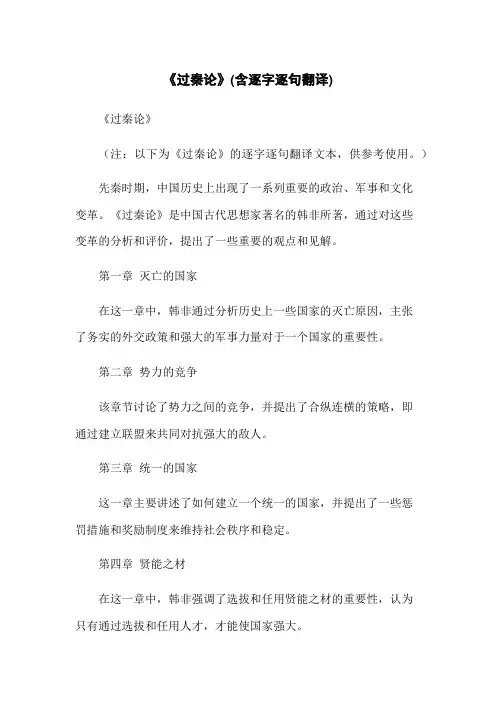
《过秦论》(含逐字逐句翻译)《过秦论》(注:以下为《过秦论》的逐字逐句翻译文本,供参考使用。
)先秦时期,中国历史上出现了一系列重要的政治、军事和文化变革。
《过秦论》是中国古代思想家著名的韩非所著,通过对这些变革的分析和评价,提出了一些重要的观点和见解。
第一章灭亡的国家在这一章中,韩非通过分析历史上一些国家的灭亡原因,主张了务实的外交政策和强大的军事力量对于一个国家的重要性。
第二章势力的竞争该章节讨论了势力之间的竞争,并提出了合纵连横的策略,即通过建立联盟来共同对抗强大的敌人。
第三章统一的国家这一章主要讲述了如何建立一个统一的国家,并提出了一些惩罚措施和奖励制度来维持社会秩序和稳定。
第四章贤能之材在这一章中,韩非强调了选拔和任用贤能之材的重要性,认为只有通过选拔和任用人才,才能使国家强大。
第五章田制守则该章节详细介绍了田制的守则,包括如何分配土地、税收和劳动力等方面的问题。
第六章刑罚之繁在这一章中,韩非探讨了刑罚的繁琐和复杂性,并提出了简化刑法、加强执行力度的建议。
第七章兵制之要该章节阐述了兵制的重要性,包括组织结构、训练和装备等方面的问题。
第八章纪律的重要性在这一章中,韩非强调了军队纪律的重要性,并提出了一些措施来确保纪律的执行。
第九章士民之治该章节探讨了士民之间的关系,倡导了以法治国和尊重士民的观念。
(注:本文档涉及的附件包括相关政策文件、历史资料和研究报告等,供读者参考。
)法律名词及注释:1.外交政策:指一个国家在对外事务中所采取的政策和策略,包括对外关系、对外经济、外交手段等方面的决策和实施。
2.强大的军事力量:指一个国家拥有强大、先进的军事力量,包括军队的数量、装备水平、战斗力等方面的优势。
3.合纵连横:古代战争中一种战略策略,即通过建立联盟来共同对抗强大的敌人,达到共同发展、互利互惠的目的。
4.社会秩序和稳定:指社会生活的规范和秩序,以及社会的稳定状态。
包括法律的尊重、人民的安居乐业等方面。
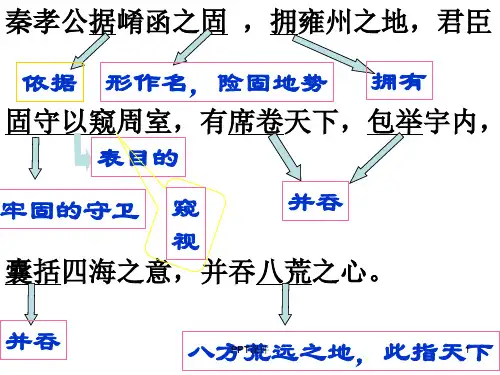
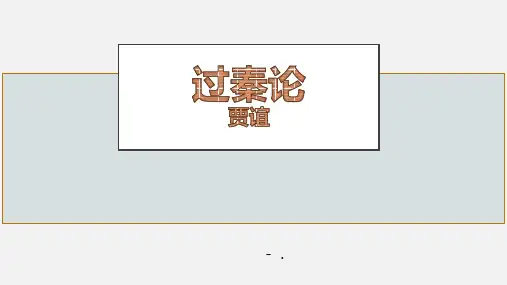


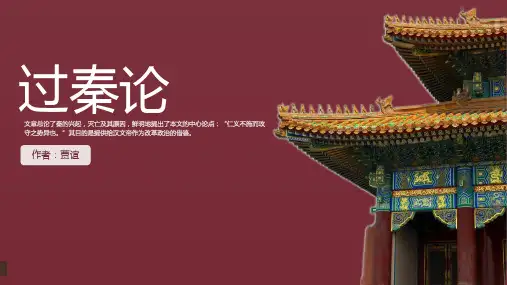


《过秦论》(含逐字逐句翻译)
《过秦论》是中国春秋战国时期的一篇重要的政治议论文,作者是战国时期的思想家韩非子。
下面是《过秦论》的逐字逐句翻译:千二百五十四年前,秦始皇嬴政篡夺了中国的天下。
他集中了六国的权力,真正实现了统一。
他的政府制度彻底改变了中国古代的政治形态,使国家变得强大。
秦地狭小,人口稀少,却能制霸天下。
皇帝和他的世家家族,依靠他们的智慧和勇气,改变了中国各国之间的关系。
他们通过战争和政治手段,征服了世界。
秦朝的统治者具有强大的权力,他们使用暴力手段来镇压政治敌手。
他们实行了严格的法制,并对百姓进行高压统治。
车同轨,书同文,服制度,货币单位,以及其他各种制度,都成为了整个国家的统一标准。
,秦朝的统治虽然有效,但也存在着一些问题。
皇帝的权力太过集中,官僚制度太过庞大,政府的决策常常不符合实际情况。
秦朝统治者对待百姓的态度也十分残忍,造成了社会不稳定。
《过秦论》通过讽刺和批评,揭示了中国古代政治的弊端。
它提出了一种政治理念,即统治者应该注重君臣、父子、夫妇、长幼之间的道义关系,并通过仁爱之心来统治国家。
《过秦论》的出现,标志着中国政治思想的发展。
它对中国古代政治的批判和反思,对后来的政治学家和思想家有着重要的影响。


《过秦论》(含逐字逐句翻译)过秦论引言《过秦论》是中国古代文学名著《史记·太史公自序》中的一篇文章。
这篇文章是史记的作者司马迁撰写的自序,旨在说明撰写史记的背景和目的。
整篇文章以历史事件为线索,借用“过秦”这一典故,引述历史故事,以表达司马迁的观点和写作风格。
逐字逐句翻译过秦论秦始皇嬴政,最初建立了一个统一的封建帝国,征服了六国,实现了中国的统一。
然而,嬴政作为帝王,却不懂得如何以德治国。
他采用酷刑来让人们听从他的命令,而不是通过德行来取信于人民。
这种统治方式带来了压迫和恐怖,人们的生活变得极其难点。
秦始皇统一了中国后,开始对文化进行大规模的破坏。
他焚书坑儒,破坏了中国几千年的文化传统。
这种行为引起了广泛的反对和不满,人们对秦始皇的统治产生了强烈的不满情绪。
儒家学者李斯奉秦始皇之命,编写了《焚书坑儒法》。
这项法律规定,凡是儒家经典和其他学术著作都必须被销毁,不经授权不得传抄。
这导致了中国文化的破坏和知识的匮乏,世代流传的书籍纷纷被焚毁,学术界遭受了巨大的打击。
尽管秦朝在短期内实现了统一,但由于统治方法残酷,独断专行,以及对文化的破坏,秦朝最终走向了灭亡。
司马迁在《史记》中对这段历史进行了深入的研究和记录,希翼这可以成为后世的警示。
过秦论的意义《过秦论》通过对秦朝统治的揭示,警示人们要重视德治。
毫无疑问,一个国家或者一个帝王,如果只靠暴力盛行,不尊重德行和人民的福祉,势必会走向衰败。
文中提到的焚书坑儒等行为,也说明秦朝忽视了知识和文化对于国家发展的重要性,这也是一个令人反思的问题。
《过秦论》引用历史故事,通过反例告诫人们,惟独尊重德行,注重文化教育,才干实现国家的长治久安和繁荣发展。
秦朝的衰亡为后世帝王和统治者提供了不少借鉴和警示。
因此,我们在今天仍然可以从中吸收教训,向历史学习,避免犯类似的错误。
结语《过秦论》是一篇以秦朝统治为背景的文章,通过对秦朝统治方式的揭示,提出了尊重德行和注重文化教育的重要性。
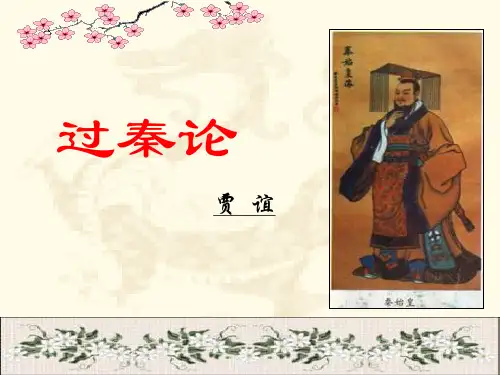
《过秦论》(含逐字逐句翻译)On the Faults of Qin by Jia YiOriginal Text and TranslationPart One秦孝公据崤函之固,拥雍州之地,君臣固守以窥周室,有席卷天下,包举宇内,囊括四海之意,并吞八荒之心。
当是时也,商君佐之,内立法度,务耕织,修守战之具;外连衡而斗诸侯。
于是秦人拱手而取西河之外。
孝公既没,惠文、武、昭襄蒙故业,因遗策,南取汉中,西举巴、蜀,东割膏腴之地,北收要害之郡。
诸侯恐惧,会盟而谋弱秦,不爱珍器重宝肥饶之地,以致天下之士,合从缔交,相与为一。
当此之时,齐有孟尝,赵有平原,楚有春申,魏有信陵。
此四君者,皆明智而忠信,宽厚而爱人,尊贤而重士,约从离衡,兼韩、魏、燕、楚、齐、赵、宋、卫、中山之众。
于是六国之士,有甯越、徐尚、苏秦、杜赫之属为之谋,齐明、周最、陈轸、召滑、楼缓、翟景、苏厉、乐毅之徒通其意,吴起、孙膑、带佗、倪良、王廖、田忌、廉颇、赵奢之伦制其兵。
尝以十倍之地,百万之众,叩关而攻秦。
秦人开关延敌,九国之师,逡巡而不敢进。
秦无亡矢遗镞之费,而天下诸侯已困矣。
于是从散约败,争割地而赂秦。
秦有余力而制其弊,追亡逐北,伏尸百万,流血漂橹。
因利乘便,宰割天下,分裂山河。
强国请服,弱国入朝。
延及孝文王、庄襄王,享国之日浅,国家无事。
及至始皇,奋六世之余烈,振长策而御宇内,吞二周而亡诸侯,履至尊而制六合,执敲扑而鞭笞天下,威振四海。
南取百越之地,以为桂林、象郡;百越之君俯首系颈委命下吏。
乃使蒙恬北筑长城而守藩篱却匈奴七百余里胡人不敢南下而牧马士不敢弯弓而报怨于是废先王之道焚百家之言以愚黔首隳名城杀豪杰收天下之兵聚之咸阳销锋镝铸以为金人十二以弱天下之民然后践华为城因河为池据亿丈之城临不测之渊以为固良将劲弩守要害之处信臣精卒陈利兵而谁何天下已定始皇之心自以为关中之固金城千里子孙帝王万世之业也始皇既没余威震于殊俗然陈涉瓮牖绳枢之子氓隶之人而迁徙之徒也才能不及中人非有仲尼墨翟之贤陶朱猗顿之富蹑足行伍之间而倔起阡陌之中率疲弊之卒将数百之众转而攻秦斩木为兵揭竿为旗天下云集响应赢粮而景从山东豪俊遂并起而亡秦族矣且夫天下非小弱也雍州之地崤函之固自若也陈涉之位非尊于齐楚燕赵韩魏宋卫中山之君也锄櫌棘矜非铦于钩戟长铩也谪戍之众非抗于九国之师也深谋远虑行军用兵之道非及乡时之士也然而成败异变功业相反何也试使山东之国与陈涉度长絜大比权量力则不可同年而语矣然秦以区区之地致万乘之势序八州而朝同列百有余年矣然后以六合为家崤函为宫一夫作难而七庙隳身死人手为天下笑者何也仁义不施而攻守之势异也Qin Xiaogong occupied the stronghold of Yao and Han, possessed the land of Yongzhou, and his lord and ministers guarded it firmly to spy on the Zhou dynasty. He had the intention of sweeping the world, encompassing the universe, contning the four seas, and swallowing the eight wildernesses. At that time, Shang Jun assisted him, established laws and regulations internally, promoted farming and weaving, and prepared for defense and war. He allied with other states externally and fought agnst the feudal lords. Thus, the Qin people easily took the land beyond the west river. After Xiaogong died, Huiwen, Wu, and Zhaoxiang inherited his legacy and followed his plans. They took Hanzhong to the south, conquered Ba and Shu to the west, cut off the fertile land to the east, and seized the key regions to the north. The feudal lords were afrd, and formedalliances to weaken Qin. They did not care about their precious treasures, rich lands, or fat territories, but only wanted to gather the men of the world, unite in friendship, and join as one. At that time, Qi had Mengchang, Zhao had Pingyuan, Chu had Chunshen, and Wei had Xinling. These fourlords were all wise and loyal, generous and benevolent, respectful of talents and courteous to scholars. They made agreements with each other and balanced the powers. They combined the forces of Han, Wei, Yan, Chu, Qi, Zhao, Song, Wei, and Zhongshan. Thus, the men of the six states had Ningyue, Xushang, Suqin, Duhe and others as their strategists; Qiming, Zhouzui, Chenzhen, Zhaohua, Louhuan, Dijing, Suli, Leyi and others as their communicators; Wuqi, Sunbin, Dtuo, Niliang, Wangliao, Tianji, Lianpo, Zhaoshe and others as their generals. They once attacked Qin with ten times its land and a million troops. The Qin people opened their gates and lured the enemy in. The army of the nine states hesitated and did not dare to enter. Qin did not lose a single arrow or a spearhead, but the feudal lords were already exhausted. Thus they dispersed and broke their alliance. They competed to cede land and bribe Qin. Qin had surplus strength and exploited their weakness. They pursued and chased them northward. TheyPart Twopiled up corpses by the millions, and blood flowed like rafts. They took advantage of the situation and carved up the world, dividing the mountns and rivers. The strong states surrendered, and the weak states pd tribute. Until Xiaowen and Zhuangxiang, they enjoyed their kingdom for a short time, and the state had no troubles. When Shihuang came to power, he exerted the remning strength of six generations, wielded his long strategy and ruled the universe, swallowed the two Zhou dynasties and destroyed the feudal lords, stepped on the supreme position and controlled the six directions, held the whip and rod and whipped the world, and his might shook the four seas. He took the land of Byue to the south, and made it Guilin and Xiangjun; the kings of Byue bowed their heads,tied their necks, and submitted to his officials. He sent Mengtian to build the Great Wall to the north and guard the fence to keep out the Xiongnu for more than seven hundred li. The barbarians did not dare to come south and graze their horses, and the soldiers did not dare to bend their bows and compln. He abolished the ways of the former kings, burned the books of a hundred schools, and made the people ignorant. Hedemolished the famous cities, killed the heroes, collected the weapons of the world, and gathered them in Xianyang. He melted them into golden statues of twelve men to weaken the people of the world. Then he built a city on Mount Hua, and made a pool by the river. He occupied a city of a hundred zhang high, and faced an unfathomable abyss as his defense. He had good generals and strong crossbows guarding the key points. He had loyal ministers and elite soldiers displaying their powerful weapons. Who could challenge him? The world was already settled. Shihuang's heart thought that he had a secure place in Guanzhong, a golden city of a thousand li, a dynasty of ten thousand generations for his descendants. After Shihuang died, his awe still remned in different customs. But Chen She, a son of a wicker basket and a wooden door, a man of lowly status and a migrant worker, had no talent beyond ordinary people, nor was he as wise as Confucius or Mozi, or as rich as Tao Zhu or Yi Dun. He sneaked among the ranks of soldiers with his feet bare, and rose up among the fields with his hoe handle. He led a few hundred exhausted troops, turned around and attacked Qin. Hechopped wood for weapons, and rsed poles for flags. The people of the world gathered and responded to him. They plundered food and followed him. The heroes of Shandong rose up together and exterminated the Qin clan. Now, the world is not small or weak. The land of Yongzhou and the stronghold of Yao and Han are still there. Chen She's position was not more honorable than the kings of Qi, Chu, Yan, Zhao, Han, Wei, Song, Wei, or Zhongshan. His hoe handle was not sharper than hooks or spears or long swords. His exiled troops were not stronger than the armies of the nine states. His deep planning and far-sightedness, his way of marching and using soldiers were not better than those of his contemporaries. Yet he succeeded in changing things around and reversing his fortunes. Why? If you try to compare the states of Shandong with Chen She in terms of length or size, weight or strength, they cannot be mentioned in the same year. Yet Qin used its small territory to achieve a power of ten thousand chariots, ranked eight states and made them pay homage to it for more than a hundred years. Then it madePart Threethe six directions its home and Yao and Han its palace. One man rebelled and the seven temples collapsed. He died by human hands and became the laughingstock of the world. Why? Because he did not practice benevolence and righteousness, and his offensive and defensive positions were different.是故明主虑之,良将修之,鉴于前事,戒于后人。